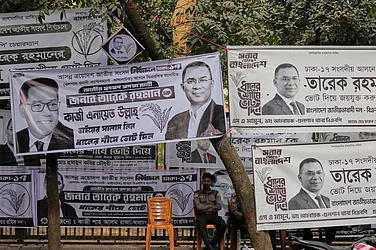In a defeat for gay rights, the Supreme Court's conservative majority ruled on Friday that a Christian graphic artist who wants to design wedding websites can refuse to work with same-sex couples. The court ruled 6-3 for designer Lorie Smith despite a Colorado law that bars discrimination based on sexual orientation, race, gender and other characteristics. Smith had argued that the law violates her free speech rights. Smith's opponents warned that a win for her would allow a range of businesses to discriminate, refusing to serve Black, Jewish or Muslim customers, interracial or interfaith couples or immigrants.
But Smith and her supporters had said that a ruling against her would force artists — from painters and photographers to writers and musicians — to do work that is against their beliefs. The decision is a win for religious rights and one in a series of cases in recent years in which the justices have sided with religious plaintiffs. Last year, for example, the court ruled along ideological lines for a football coach who prayed on the field at his public high school after games. The decision is also a retreat on gay rights for the court. For two decades, the court has expanded the rights of LGBTQ people, most notably giving same-sex couples the right to marry in 2015 and announcing five years later that a landmark civil rights law also protects gay, lesbian and transgender people from employment discrimination.
Even as it has expanded gay rights, however, the court has been careful to say those with differing religious views needed to be respected. The belief that marriage can only be between one man and one woman is an idea that “long has been held — and continues to be held — in good faith by reasonable and sincere people here and throughout the world,” Justice Anthony Kennedy wrote in the court's gay marriage decision. The court returned to that idea five years ago when it was confronted with the case of a Christian baker who objected to designing a cake for a same-sex wedding. The court issued a limited ruling in favour of the baker, Jack Phillips, saying there had been impermissible hostility toward his religious views in the consideration of his case.
Phillips' lawyer, Kristen Waggoner, of the Alliance Defending Freedom, also brought the most recent case to the court. Smith, who owns a Colorado design business called 303 Creative, does not currently create wedding websites. She has said that she wants to but that her Christian faith would prevent her from creating websites celebrating same-sex marriages. And that's where she runs into conflict with state law. Colorado, like most other states, has a law forbidding businesses open to the public from discriminating against customers.
Colorado said that under its so-called public accommodations law, if Smith offers wedding websites to the public, she must provide them to all customers, regardless of sexual orientation. Businesses that violate the law can be fined, among other things. Smith argued that applying the law to her violates her First Amendment rights. The state disagreed. The case is 303 Creative LLC v. Elenis, 21-476.





















